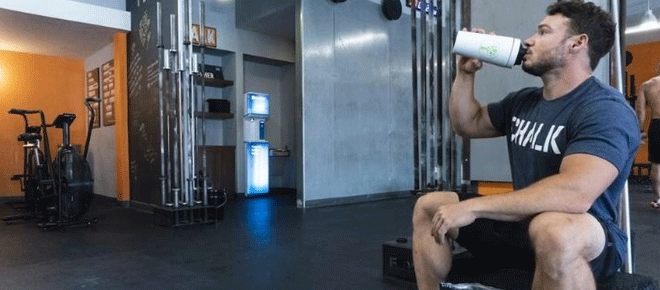5 Healthy Eating Habits to Support Your Fitness Goals

If you're looking to lose weight or build muscle, it's important to develop healthy eating habits. These habits will help you stick with your diet and reach your goals long-term.
The first step is to reflect on your current eating habits. This will help you identify triggers and habits that are causing you to overeat or undereat.
Eat Plenty of Fresh Fruits and Vegetables
Eating a diet rich in fresh fruits and vegetables is important to support your fitness goals. These foods contain many nutrients that your body needs to thrive, including vitamins, minerals, antioxidants, and fiber. Fruits and vegetables are also low in calories and fat, making them a healthy addition to your diet.
The GAT Sport Coupon Codes recommends eating a variety of different colors and types of products to provide your body with all the nutrients it needs. The colors of the vegetables and fruit you eat can help your body absorb more of the plant chemicals known as phytochemicals that are beneficial for your health.
Besides being good for your heart and weight, eating plenty of fresh fruits and vegetables can help you feel energized and avoid chronic diseases like high blood pressure, diabetes, cancer, and heart disease. They are also high in fiber, which can help you feel full and stay satisfied for longer periods.
Another reason to eat plenty of fruits and vegetables is that they are a great source of antioxidants, which can help prevent muscle injury, swelling, pain, and inflammation. They also have nutrients that promote healthy muscle growth and recovery after a workout, and they are packed with water-soluble vitamins and other essential nutrients.
One of the best ways to make sure you get enough of these nutrients is to stock your fridge and gym bag with a variety of fruits and vegetables. Add them to your breakfast to boost your energy levels and keep your immune system strong, or snack on fruit before or after exercise to fuel your body.
While fresh fruit and vegetables are great for your health, it is important to select and prepare them properly to prevent food poisoning. Often, raw fruit and vegetables carry harmful bacteria that can make you sick. So, it is important to wash your fruits and vegetables before you eat them or cook them. It is also important to store your fresh fruit and vegetables correctly to prevent spoilage.
Eat a Balanced Diet
A balanced diet helps you achieve your fitness goals by supplying your body with the necessary nutrients it needs to stay healthy. Eating a balanced diet also decreases your risk of developing chronic health conditions and diseases such as heart disease, cancer, and diabetes.
A well-balanced diet includes the proper proportions of carbohydrates, proteins, fats and lipids, micronutrients, and water. Carbohydrates provide energy, lipids, and protein are essential for the growth and repair of cells, micronutrients help maintain the integrity of the immune system, and water is vital for good health.
It’s important to eat a variety of different types of food from each of the five major groups to receive all the required nutrients. Try to consume a mixture of fresh fruits and vegetables, whole grains, lean meats and fish, low-fat dairy, and healthy fats.
Keep a supply of healthy snacks to hand so you can make smart choices when you’re hungry and need a boost. This will help you avoid unhealthy options like fast foods or processed snacks that contain large amounts of sugar, salt, and unhealthy fats.
The right foods can help you perform at your best during workouts, reduce fatigue, and speed up recovery time after exercise. By choosing the right foods, you can support your training and reach your fitness goals.
A healthy diet and proper exercise are the best ways to support your fitness goals and improve your overall health. A diet high in calories, saturated and trans fats, added sugars, and low in essential nutrients can lead to weight gain, obesity, diabetes, and increased risk of serious health problems such as heart disease.
Drink Plenty of Water
If you are looking to improve your fitness, one of the most important things that you can do is drink plenty of water.
The water in your body helps support the function of all of the cells in your body, allowing you to digest for optimum nutrition and flush away toxins from the body. It also helps control your appetite and aids in the metabolization of fat.
It's also vital for your exercise goals because it helps you regulate body temperature, transports nutrients to your cells, and prevents heat stress.
In addition, it can help you avoid dehydration, which can lead to fatigue and a loss of performance.
Your muscle cells require a lot of water to function properly, so when they are dehydrated, they break down more quickly and build up more slowly. The body loses water through sweating, breathing, and the elimination of waste.
For your best results, drink 2 to 3 ounces of water for every pound of body weight in the two hours before you start your workout. This is the perfect amount of fluid for you to stay hydrated without slowing down your workout.
Then, during your workout, aim to drink a small amount of water at regular intervals of about 15 - 20 minutes. You will need to keep a water bottle nearby so that you can stay well-hydrated throughout your exercise routine! You can even set a goal for how many ounces you want to drink before you finish your workout. By keeping your hydration consistent, you will be able to achieve your goals for this year! If you want to save huge money then check out the Food and Drinks Discount Code.
Eat Healthy Snacks
Snacking on healthy foods can help you maintain a balanced diet, boost energy, and feel satisfied. The key is to choose snacks that contain complex carbohydrates, protein, and healthy fats.
Snacks that are low in calories and high in fiber can help keep you fuller longer and support your health goals. Nuts, for example, are full of heart-healthy fats and protein and provide the nutrients your body needs to stay energized throughout the day.
Fruits, on the other hand, are rich in vitamins, minerals, and water and are easy on your digestive system. They’re also a great source of natural sugars that can provide a quick boost of energy during your workout.
To get a variety of healthy snacks in your diet, try adding more raw fruits and vegetables to your meals. This can help you fill half your plate with healthy options that are high in fiber and low in calories.
Another way to add more nutritious snacks to your diet is to prepare them at home instead of grabbing something from the grocery store. This way, you know that the snacks you choose are made with whole ingredients, and you can control the amount of sodium, fat, and added sugars that you consume.
If you’re feeling hungry and need a snack, reach for an apple or a banana. These fruits are rich in potassium and magnesium, which can help replenish your body’s minerals. They’re also low in calories and high in water, so they’re a great choice for an on-the-go meal or snack. You can pair these fruits with a serving of peanut butter or almond butter for an extra boost of protein and healthy fats.
Exercise Regularly
If you're serious about losing weight, building muscle, or improving your overall health and fitness, exercise is an essential part of your plan. It will help you reach your goals and maintain them for longer.
Exercising regularly also helps you feel better and sleep better. It relieves stress, improves memory, reduces anxiety, and boosts your mood. And it may help you deal with common mental health problems, like depression and ADHD.
You can benefit from a variety of different types of exercises. Some are easy to do, while others require a bit more effort and are more challenging for you. If you're not accustomed to exercise, start slowly and gradually increase your activity levels over time.
A healthy diet, combined with regular exercise, is a powerful combination for supporting your weight loss and fitness goals. Eating a balanced diet with plenty of fresh fruits and vegetables, drinking lots of water, and eating snacks that are high in nutrients can be an easy way to stay on track and support your fitness goals.
Another key aspect of a healthy diet is planning your meals and workouts. This allows you to save time and avoid making poor food choices on the go.
It also helps you stay on track with your nutrition, especially if you have a busy schedule. Make sure to include protein, complex carbohydrates, and healthy fats in your diet, eat a nutritious breakfast and snack throughout the day, and stick to a schedule that works for you.
Eating the right foods at the right times can help you get maximum energy for your workouts, which will allow you to go harder and achieve more than you could otherwise. It's also a great way to ensure that you're getting the right amount of calories for your exercise routine.
Conclusion
Adopting healthy eating habits is crucial to support your fitness goals. These habits include planning meals, consuming a balanced diet, staying hydrated, limiting processed foods, and practicing moderation. By incorporating these habits into your lifestyle, you can fuel your body properly and achieve your fitness goals.








